| Srl | Item |
| 1 |
ID:
117539
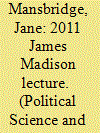

|
|
|
|
|
| Publication |
2012.
|
| Summary/Abstract |
Trend plus inaction equals drift. When a trend has external causes and no one can act to intervene, that inaction leads to drift-the unimpeded trajectory of change. Drift in the United States produces the domination of American democracy by business interests. Drift in international decisions produces global warming. Specific institutional designs for government, such as the US separation of powers, can cause the inaction that facilitates drift. More fundamentally, ingrained patterns of thinking can cause inaction. Here I argue that the long and multifaceted resistance tradition in the West contributes to inaction by focusing on stopping, rather than using, coercion.
|
|
|
|
|
|
|
|
|
|
|
|
|
|
|
|
| 2 |
ID:
141250
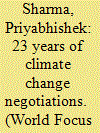

|
|
|
|
|
| Summary/Abstract |
Over the decades, climate change has emerged as an established wisdom of contemporary times. This has happened merely in the span of last three decades. Prior history of the science of climate change was full with controversy and debate. When at the turn of the nineteenth century the Swedish chemist Svante Arhenius (1896) proposed this hypothesis for the first time that man-induced carbon dioxide in the atmosphere of earth would lead to an increase in surface temperature through the greenhouse effect, not many took him seriously. To believe that the climate of earth was changing at a pace and scale far greater than the routine characteristic change forming part of the geological history of earth was too farfetched a contention at that time. For about next half a century as a result of some evidence it came generally to be agreed upon that some sort of climate change was happening but it still remained largely unclear whether this change had been happening in the direction of global cooling or that of global warming.
|
|
|
|
|
|
|
|
|
|
|
|
|
|
|
|
| 3 |
ID:
113145
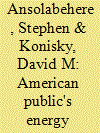

|
|
|
|
|
| Publication |
2012.
|
| Summary/Abstract |
Public opinion about energy can be understood in a unified framework. First, people evaluate key attributes of energy sources, particularly a fuel's cost and environmental harms. Americans, for example, view coal as relatively inexpensive but harmful, natural gas as less harmful but more expensive, and wind as inexpensive and not harmful. Second, people place different weights on the economic and environmental attributes associated with energy production, which helps explain why some fuels are more popular than others. Americans' attitudes toward energy are driven more by beliefs about environmental harms than by perceived economic costs. In addition, attitudes about energy sources are largely unrelated to views about global warming. These findings suggest that a politically palatable way to reduce greenhouse gas emissions is through regulation of traditional pollutants associated with fossil fuels, rather than a wholly new carbon policy.
|
|
|
|
|
|
|
|
|
|
|
|
|
|
|
|
| 4 |
ID:
069821
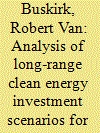

|
|
|
| 5 |
ID:
127987
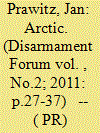

|
|
|
|
|
| Publication |
2014.
|
| Summary/Abstract |
Nuclear-weapon-free zones (NWFZs) have emerged as an important but largely unnoticed
approach towards a nuclear-weapon-free world, overshadowed by the more visible Treaty on
the Non-Proliferation of Nuclear Weapons (NPT). Zones established so far cover some 50% of
the world's land areas, including 99% of all land south of the equator and 74% of all land outside
nuclear-weapon states1
(NWSs). Altogether, NWFZs include 119 states and 18 other territories,
with some 1.9 billion inhabitants. Several more NWFZs are currently under discussion-
one of which is a proposed zone to cover the circumpolar Arctic. Such a zone has been
discussed since the mid-1960s, but it has recently become politically feasible following global
warming and the gradual melting of the polar ice-cap.
|
|
|
|
|
|
|
|
|
|
|
|
|
|
|
|
| 6 |
ID:
122075
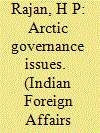

|
|
|
| 7 |
ID:
106468
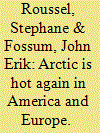

|
|
|
| 8 |
ID:
080851
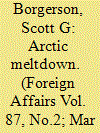

|
|
|
|
|
| Publication |
2008.
|
| Summary/Abstract |
Thanks to global warming, the Arctic icecap is rapidly melting, opening up access to massive natural resources and creating shipping shortcuts that could save billions of dollars a year. But there are currently no clear rules governing this economically and strategically vital region. Unless Washington leads the way toward a multilateral diplomatic solution, the Arctic could descend into armed conflict
|
|
|
|
|
|
|
|
|
|
|
|
|
|
|
|
| 9 |
ID:
109866
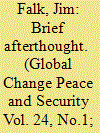

|
|
|
| 10 |
ID:
086035
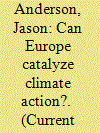

|
|
|
|
|
| Publication |
2009.
|
| Summary/Abstract |
"Global warming is an issue that cries out for central policy coordination, and in many respects policy making in this area has paved the way for EU cooperation."
|
|
|
|
|
|
|
|
|
|
|
|
|
|
|
|
| 11 |
ID:
111770
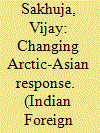

|
|
|
| 12 |
ID:
108496
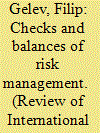

|
|
|
|
|
| Publication |
2011.
|
| Summary/Abstract |
After the terrorist attacks of 11 September 2001 Ulrich Beck placed terrorism alongside other potentially catastrophic events such as global warming, nuclear disaster, and influenza as one of the 'dimensions' of risk society. In risk society, executive governments take 'precautionary measures' and parliaments pass 'preventative laws' allowing them to accumulate information, detain terrorism suspects, freeze funds and prohibit various groups, in order to stop catastrophic risks from eventuating. International Relations and legal scholars have used risk society theory or the ideas of Michel Foucault to criticise such excesses of the executive and parliamentary branches of government. Most studies either ignore the judiciary or argue that it stands in opposition to the other branches of governments, that it imposes checks and balances in order to uphold the rule of law and protect individual rights. The article argues that this view is naïve and does not acknowledge a long history of judicial deference to the will of the executive and parliament. Through an analysis of case law from Australia and Canada the article explores parallels between early 21st century judicial reasoning and previous periods of crisis, including the Cold War, while identifying some new 'precautionary approach' aspects. The judiciary defers to the executive, asserts that the executive is more accountable than it, and seeks to avoid responsibility for engaging in this 'precautionary justice'. Furthermore, seized by the same fear of terrorism as executive governments, the judiciary shows an ability to adapt existing legal concepts to the exigencies of risk society. The article concludes that as the memory of the 9/11 attacks fades some of the most draconian preventative measures may be scaled back but the judiciary cannot be relied on to keep the executive or parliament in check.
|
|
|
|
|
|
|
|
|
|
|
|
|
|
|
|
| 13 |
ID:
122005
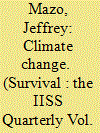

|
|
|
|
|
| Publication |
2013.
|
| Summary/Abstract |
Climate change caused by global warming is, arguably, a serious, even existential, threat to the world order and to the welfare of humanity. No one really knows; there are many uncertainties around the rate of warming and the severity of its environmental and social impacts, and hence the most effective, and cost-effective, ways to avoid or ameliorate them. But over the last five or six years, public discourse has been driven less by policy needs and more by punditry. The propagation of myths and misconceptions, whether deliberate or inadvertent, continues to poison the debate over how to mitigate or adapt to climate change.
|
|
|
|
|
|
|
|
|
|
|
|
|
|
|
|
| 14 |
ID:
104791
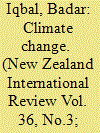

|
|
|
| 15 |
ID:
093608
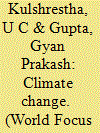

|
|
|
| 16 |
ID:
093611
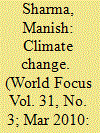

|
|
|
| 17 |
ID:
137583
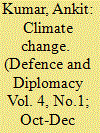

|
|
|
| 18 |
ID:
141236
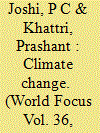

|
|
|
|
|
| Summary/Abstract |
The present article tries to locate the climate change diplomacy and politics within the larger framework of history and culture. Historical roots of climate change diplomacy are linked with scientific discoveries and a North-South geo-political binary. The climate change diplomatic negotiations are located within the backdrop of cultural theory and grand narratives of different geographical spaces. Broadly there are three cultural narratives regarding climate change that originate at different places and attribute different causes for climate change and hence float different solutions to tackle the problem. The contemporary mantra for a climate deal should be an integration of various narratives and stories rather than the competition of claiming one or the other as the main narrative and ignoring the other.
|
|
|
|
|
|
|
|
|
|
|
|
|
|
|
|
| 19 |
ID:
141245
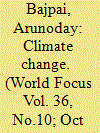

|
|
|
|
|
| Summary/Abstract |
There is no need to emphasize the fact that the climate change crisis is a major global challenge of our times. However, the climate change crisis is insurmountable, once it crosses the threshold. It threatens not only our present generations but also the future of entire humanity. The impacts of climate change, once set in, are not reversible in the short run. The assessment of the global warming trends and their likely adverse consequences is made by the Inter-Governmental Panel on Climate Change in its five Assessment Reports published respectively in the years 1990, 1996, 2001, 2007 and 2014. The gist of these reports is that the global mean temperature has increased by 0.3 to 0.6 degree centigrade in last 100 years but it is likely to increase by 0.3 C per annum in 21st century. The Synthesis Report of the Fifth Assessment Report (IPCL: 2014) remarks, 'Continued emission of greenhouse gases will cause further warming and long-lasting changes in all components of the climate system, increasing the likelihood of severe, pervasive and irreversible impacts for people and ecosystems'.
|
|
|
|
|
|
|
|
|
|
|
|
|
|
|
|
| 20 |
ID:
141246
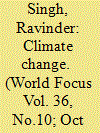

|
|
|
|
|
| Summary/Abstract |
Climate Change is a serious global environmental concern. It is primarily caused by the building up of Green House Gases (GHG) in the atmosphere. The global increases in carbon dioxide concentration (CO2) are primarily due to fossil fuel use and due to agriculture land use change yielding the methane and nitrous oxide. Global Warming is a specific example of the broader term “Climate Change”. It refers to the observed increase in the average temperature of the air near earth’s surface and oceans in recent decades. It is adversely affecting particularly the developing countries because they have neither the capacity nor the resources to deal with this challenge threatening the human existence (1). Scientific studies have proved the global atmospheric concentrations of most important Green House Gases-carbon dioxide (CO2), methane (CH4) and nitrous oxide (NO2) have increased markedly due to human activities since 1750.
|
|
|
|
|
|
|
|
|
|
|
|
|
|
|
|